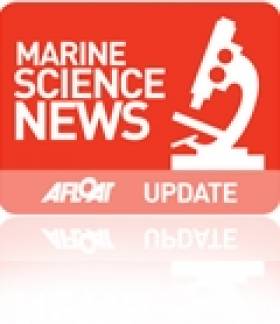Displaying items by tag: ESA
Irish Marine Innovations Applauded By Euro Space Agency
#MarineScience - Irish companies and researchers have distinguished themselves by developing innovative maritime services using satellite derived data in areas as diverse as marine renewables, fisheries protection, aquaculture and tourism.
That was the message from Dr Volker Liebig, director of Earth observation programmes with the European Space Agency at the opening of a conference on 'Space Innovation - Powering Blue Growth' at the National Maritime College of Ireland in Cork last week.
Minister for Research and Innovation Sean Sherlock, who opened the two-day event, said: “There are over 40 Irish companies currently engaged in ESA programmes, many of which are directly addressing global challenges such as climate change, sea-level rise, maritime surveillance and marine environmental monitoring.
"This is a growing industry and one which will guarantee high-quality jobs for Irish people and benefit our economy into the future.”
The conference - jointly organised by the ESA, the European Commission (DG Maritime Affairs), Enterprise Ireland, University College Cork’s Coastal and Marine Research Centre, the Irish Coast Guard and the Irish Naval Service - focussed on the contribution of space to maritime policy implementation; showed how new scientific results and innovative services assist in achieving targets set by the Integrated Maritime Policy for the European Union (IMP); and assessed how the ESA space development activities and the IMP can contribute to economic growth in Europe.
Geoffrey O’Sullivan, representing Marine Institute CEO Dr Peter Heffernan, said that the conference "ably demonstrated that Space Remote Sensing had a very positive contribution to make towards developing our blue economy.”
Examples given included fisheries management (including illegal, unreported and unregulated fishing); environmental assessment; detection of oil spills and harmful algal blooms; site survey for offshore renewable energy and aquaculture platforms; search and rescue; and maritime domain awareness (MDA).
O'Sullivan added that the Conference "validated the SMARTOCEAN (ICT and the Sea) Strategy being promoted by the Marine Institute, in identifying clear opportunities for Irish researchers and SMEs to harness their significant ICT and marine research skills and drawing on 'Big Data' provided by satellite sensors to develop of range of new products, services and applications relevant to local and global markets.”
Closing the conference, Marine Minister Simon Coveney commented that “increasing maritime situational and domain awareness is paramount in promoting a more inclusive approach to maritime development in delivering both the EU Blue Growth Strategy (2012) and Ireland’s Integrated Marine Plan (Harnessing Our Ocean Wealth) launched in 2012.
"Space based systems,” he said, “are a key component of an integrated and sophisticated maritime surveillance network.”



























































